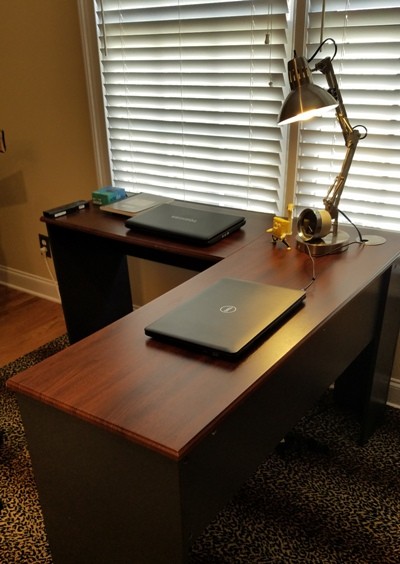I find when it comes to puzzles, there are two kinds of people. There are those who love them no matter how hard they might be. In fact, the harder the better. Then there are those who enjoy them until they become something beyond the realm of possibility to solve and the fun turns to frustration. I am a member of the latter group.
I used to enjoy puzzles. Not just the cardboard jigsaw kind. You know the ones that taunt you with the words “1000 Pieces” on the box. It’s their way of throwing down the gauntlet and saying, “Come on, I bet you can’t solve me.” All the while, they know there are only 999 pieces in the box, but you don’t discover it until two in the morning and you’re sure you can do it anyway as sure as God is your witness and you swear you’ll never go hungry again as you bite a turnip then try to make a dress out of the drapes. It’s insanity in a box for under ten bucks. What a bargain!
Does anyone ever try to order that missing piece? How would you if you did? Writing them and asking for “the piece that looks like a mushroom with a bite taken out of the top with two bits of blue sky and the corner of a flower petal” likely won’t accomplish anything. It would be easier if they’d number the back of the pieces, but where’s the fun in that?
When I was younger, I was attracted to the puzzles made of metal rings, triangles and squares. You had to figure out how to take them apart and put them back together without using a blowtorch. They were sold as magic tricks at the newsstands and novelty shops I used to frequent. I never could solve them, but they taught me a lot about using a blowtorch.
Then there was the Rubik’s Cube. I should say “is” as they are still available as a torture device … I mean “toy.” I spent hours twisting and turning my Rubik’s Cube. It sat on the table in the family room by the television. My father and I would take turns trying unsuccessfully to solve it.
For some reason I took the thing to college with me. Apparently studying wasn’t enough. I needed something else to keep me awake at night. This was before the internet, so I couldn’t Google the solution. But you could buy a book that told you how to solve it which is just what my roommate and I did. Unfortunately, since the male gender and instructions are mutually exclusive, I didn’t get past the fifth step. That didn’t keep me from solving it. You see the vinyl stickers that gave each square its color were easy to peel off and reattach. Sometimes you must think outside the box to solve the cube.
At that point, I parked the Rubik’s Cube. I was glad to be rid of this nagging plastic reminder that I’m not the sharpest tool in the shed. Having put it down, I was sure I had put it behind me. That is until marriage and the need to buy furniture.
Like most folks starting out, we didn’t have money for quality furniture. What good is an entertainment center if, after buying it, you can’t afford the popcorn to munch while soaking up a movie? Enter particle board furniture, the Rubik’s Cube of home décor.
I’ve approached putting these things together from both the jigsaw puzzle and the Rubik’s Cube angle.
The jigsaw approach involves looking at the picture on the box then using trial and error to finally arrange the pieces so they look like the picture. Success is measured by how closely the finished product resembles the picture and how many parts are leftover. The fewer parts, the better your score.
The Rubik’s method involves reading the instruction booklet. Groan. I’m not sure who writes those things, but I am convinced they aren’t the people who designed the furniture. I also doubt their instructions were written by putting the thing together first. I think they are out-of-work novelists who looked at the picture and then made up a story on how to build it. “Tab A in slot B, yeah that sounds good.” Yes, it does. Too bad the pieces are numbered, not lettered. And there are no tabs or slots. Quite the page turner.
These days I do lean more to the Rubik’s Cube method, especially since the time I tried to assemble a corner cabinet by just looking at the picture. While I was looking at the picture, my wife was looking at the instructions. When she pointed out that I was not only putting it together upside down but also inside out, I did the only thing I could. I handed her the tools and went inside to watch television. I must say she did a really good job. Unfortunately, she built it in the garage. Once constructed, it was nearly impossible to get it into the house. Ships aren’t the only things you build in the bottle.
The only thing harder than building Rubik’s Cube décor by looking at the picture or reading the instructions, is when you have neither. This happened when my son moved to California.
When he moved out of his home in Atlanta, the items he couldn’t load into his car for the cross-country trek were stored at our house. This included his desk. It was a standard L-shaped computer desk. I dutifully took it apart, being careful to put the little cam locks and pegs into a baggie.
Once at the house, I decided to set it up in my man cave. Of course, I hadn’t labeled the pieces and didn’t bother documenting the process with pictures. Best of all, I didn’t really remember what the thing looked like. Mathematically speaking, when you have five things, there are 120 possible combinations. In the case of the desk, realistically there were far fewer that made sense. But I didn’t let that stop me from trying them all. Man up, I always say!
Engineering students should have to assemble Rubik’s Cube décor without the benefit of pictures or instructions. It would be a great tool to teach many things, not the least of which is patience. If they can build it properly while floating weightlessly aboard the International Space Station, they get to keep the ship that flies them home as a souvenir.
I wrote this while sitting at that desk. Best of all, there are no leftover parts and it actually resembles a desk. I know this doesn’t make me a Mensa candidate, but it certainly is a good feeling.










